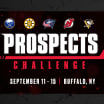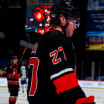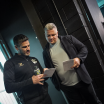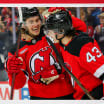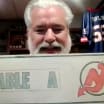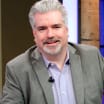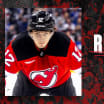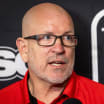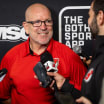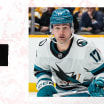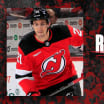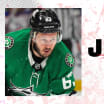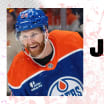10 Questions with John Hynes
Hynes on first overall pick: "It's an opportunity for us to be able to get an excellent hockey player."
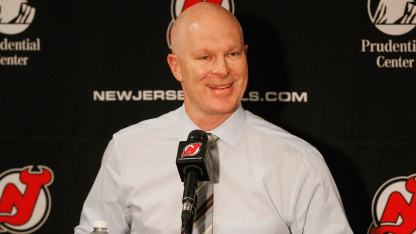
Q: You said at the end of the season that you turned down an opportunity to represent Team USA at the World Championship because you wanted to focus on the Devils and what you're trying to accomplish here in New Jersey. What have you been up to?
A: For us, we've had a lot of self-evaluation on our team and identifying areas we felt needed to be better. From a tactical standpoint, we did our full season review and now we have a couple projects that different coaches are working on. We'll prepare for some coaches' meetings throughout the summer and evaluate ourselves that way. I've also been working with management on what our team looks like, what we have coming back, preparing for the draft, preparing for the expansion draft and free agency. So there's been kind of a little bit of everything.
Q: When you do this evaluation, what are you looking at?
A: At the end of the year you always go back and look through the season in all aspects - statistically, on video and just overall impressions - because you know some of the areas you were strong and some where you were weak and we want to make those better. For example, our offensive zone play. We'd like to see significant improvement in that area heading into next year, so we'd watch all our offensive zone play over the course of the whole year - not just a few games - and there were some good things and some things that need to be better and then we'll target some teams that are really strong in the offensive zone or have lots of production and chances for in the offensive zone, and the coaches will study that team and look at the trends of what they're doing that's making them so successful.
Q: So you didn't just watch the Stanley Cup Final games for fun?
A: When the games are on and you're watching them live, you're watching them in a more casual setting and, yes, it is certainly fun to watch. But you're also probably making some mental notes of things you want to look back on. Our video coaches do a great job of breaking down each of these games just like they would do for our own games in the regular season.
Q: I know you're a student of the game and are always looking for ways to make the team better, but do your thoughts on self-evaluation extend to yourself and the rest of your coaching staff?
A: Of course! You have to self-evaluate at the end of the season and look at more than just the things on the ice. You want to look at everything - how our meetings were run, how our communication was with each other and with the players and with management, things we liked and things we may want to change. Some of it is reviewing video and some is talking with other coaches and things they're doing with their team. Some of it could be team-building ideas, some could be about team rules and regulations and standards that they have. A big part of coaching is the Xs and Os, but there's a whole other part of it where you want to make sure your teaching techniques are good, your communication techniques are good, your team-building efforts are engaging with the players and effective in trying to get everyone on the same page. Those are big parts of trying to have a much better year than we did this year and that's what we're trying to do: gather as much information as we can and see how we can apply some of these new ideas into what will work best for the New Jersey Devils.
Q: How do you check that? Where do these new ideas come from?
A: I spent some time with the New York Giants during their [offseason training activities] as well as with the New York Red Bulls. You want to try to find different ways every summer to expand your abilities as a coach and see what other people do, even in other sports. I know Coach [Ben] McAdoo is a Devils fan and brought his son to a couple games so I reached out to him and said, "Look, I'm in my offseason now and looking for ways to improve and get different ideas and see some different things to get better," and asked if it'd be possible to come over and observe for a day. He was really accepting of it and we're going to try to do the same for him in his offseason and have him be able to sit in on our meetings and see how we run things and get some different ideas for himself. It's the same thing with Jesse Marsch, the coach of the Red Bulls.
Q: What was your biggest takeaway from those experiences?
A: I would say the way those guys run their meetings and practices was refreshing in terms of how they teach and how they keep the players' attention, and then watching them run their practices and holding their guys to a certain standard in those practices. Plus, being able to sit with them in their meetings and see them plan what they wanted to do that day and then watching them go out and execute that was a great example of a high level of professionalism and ability to teach and lead. That's what I was really hoping to get out of it - finding better ways to teach and lead and developing a strong culture that we might be able to adapt to our situation here. We're no different than the players in the summer who go home and have certain things in their game that they want to work on. … We might not be training in the gym - or at least not as hard as the players - but we still have a responsibility to be better next training camp.
Q: What have you found as the biggest challenge in changing the culture here since your arrival two years ago?
A: We have a younger team and it's a new generation of player and you need to figure out how they learn, how they communicate, how you can maximize their potential and how we can develop a culture conducive to the type of success we want to have. These are things we want to be better at, we want to be experts at and we have to make sure when the guys come back here there are some new things, some things that engage them and just as we want to see improvement from them and that they've gotten better over the summer and have pointed themselves in the right direction to have a really strong, competitive season. We have to do the same thing as coaches.
Q: Switching gears a bit, how did you find out about the Devils winning the draft lottery and getting the No. 1 pick in the draft?
A: I was at home watching it. It was a pretty exciting night. When it got down to the final three, you had a feeling like the odds might really be in your favor and then, when we won it, it was exciting. It's an opportunity for us to be able to get an excellent hockey player, and you don't have to worry about other teams picking the guy that we might need or want.
Q: How involved are you with what happens on draft weekend?
A: As a coach, you don't have the chance to be involved in who gets picked because you don't have time to see these players play. That's why we have scouts. They work hard all year long to do all that research. The job of the coach, along with the general manager, is to help identify the types of players we want. Then it's up to Paul [Castron, Devils director of amateur scouting] and the scouts to really do a good job evaluating the criteria we're looking for and make the right decisions.
Q: There are three more months until the start of training camp and I know there's a lot of work to be done before then, but what's on your agenda in terms of fun?
A: The No. 1 thing for me is being able to spend lots of time with my family. I have three really young girls and even now it's been fun to go to their activities and participate in all the things they do, along with my wife as well. We'll also do a little bit of traveling to see family in July and August. My wife is from Wisconsin and I'm from Rhode Island, so we go visit family there and let the kids see their grandparents and cousins and, finally, I'll fit in some time for golf. New Jersey has some really beautiful golf courses. Gotta make some time for that. It's all about balance!

